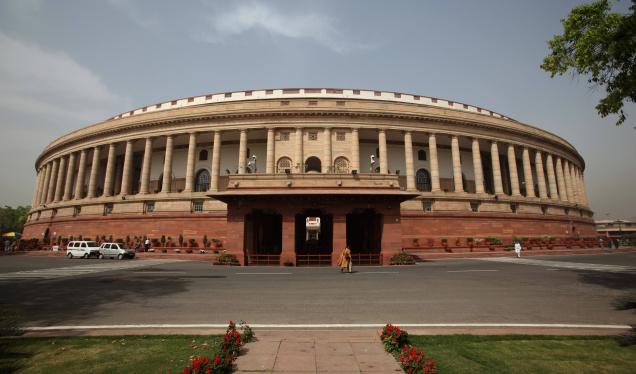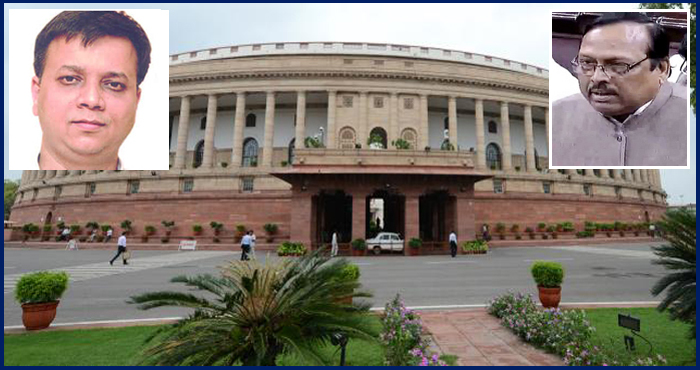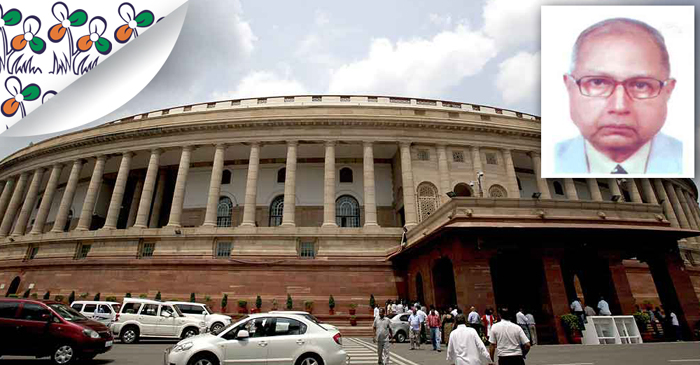Full Transcript of his speech:
Sir, the President’s Address to the Joint Session of the Parliament has lost its significance over the years as it appears to be an empty ritual and the President’s Address which is being discussed now is not an exception to it. It appears that the President’s Address is something like a report card of the Government to the parliamentarians.
But at the outset I can say, if one gives a cursory look to the President’s Address, it would appear that this Government is not a game-changer but a name-changer. As rightly pointed out by the honourable Members, particularly the Leader of Opposition, as how the names of different schemes have been changed from the previous Government’s projects to the present Government’s projects. I don’t want to repeat those.
Sir, I want to quote one line from the President’s Address, “Inclusive growth covering the poorest of the poor is my Government’s top priority.” If we take it seriously, if the Government takes it seriously, then the Government ought to have considered the UN Millennium Development Report 2014, whereby the report has assessed that 40 millions of Indian citizens are the poorest of the poor, and they constitute one-third of the poorest of the poor of the world. This is the situation prevailing in the country, and still the slogan of inclusive growth is being chanted by the new Government, without envisaging any definite action plan to help the poorest of the poor who are living in sub-human conditions.
Sir, we have heard the slogan over the years and now a new slogan, ‘Maximum Governance Minimum Government’, has been echoed in the President’s address, referring once again to the poorest of the poor. This will continue to be a hoax; I repeat, this will continue to be a hoax, until and unless the basic conditions of the poorest of the poor of our country are improved within a definite time frame.
Sir, the President’s Address mentions a Government initiative called ‘Himmat’ to ensure women’s safety in Delhi. Sir, subsequent to the Nirbhaya incident, what we find in Delhi is that atrocities on woman, particularly rape incidents, have been increasing alarmingly every day. The other day, even a Japanese woman was not spared; she was gang raped in a moving car in the national capital. What assessment will the foreigners have about the national capital of Delhi and the country as a whole when such incidents are increasing alarmingly every day? Sir, kyunki Bharat ka rajdhani me mahilao ke liye kahin safety nahi hai, sare duniya main Bharat ka chabbi kharab ho rahi hai.
Sir, the speech refers to legal reforms and the setting up of the National Judicial Appointments Commission. This is another half-truth, because the government of the day has not yet issued any notification about the setting up of the National Judicial Appointments Commission for reasons better known to the Government. There is no mention of the non-issuance of the notice for the setting up of the National Judicial Appointments Commission in the President’s speech, as a result of which, the system which was going on for a long time, over the years, at the whims and fancies of certain judicial officers, is still going on. Even in today’s newspaper we have found that one High Court judge from Odisha has been elevated to the Supreme Court and the Law Minister has justified the earlier situation which is being continued even today, without adhering to the Act which has been passed by both houses of Parliament, that is, the National Judicial Appointments Commission Act. That is, the Act has not been implemented.
Secondly, so far as judicial and legal reforms are concerned, what about the Judicial Accountability Bill proposed by the earlier Government? What about the Judicial Accountability Bill? So much has been said about judicial accountability. In so many quarters it is being discussed, but the President’s Address is conspicuously silent about the Judicial Accountability Bill, which was proposed by the earlier Government. Even those who are in the present Government supported it like anything.
Sir, we always stress on the need for administrative and electoral reforms, and I’m sorry to say that there is no mention of administrative and electoral reforms in the President’s Speech. Tto our dismay we have found that these matters have not found any place in the President’s speech.
Sir, the President’s Address has a tall claim about the formation of NITI Aayog; after eliminating the Planning Commission, the NITI Aayog has come. I have copies of the 1950 Resolution of the Central Government with me here; Resolution number 1(P)(C)/50 dated 15 March 1950, this is how the Planning Commission was formed by the first independent Government of this country, whereby the Planning Commission was given certain powers to be exercised for the planning of the country and also for plan allocation. But now, this NITI Aayog, which has been formed on 1 January of this year, says that a group of people has been entrusted with authority by the Government to formulate and regulate policies concerning transforming India. But how the transformation will come or be effected, for that there is no guideline. Nothing has been said in the features and content of this NITI Aayog. And Sir, it has been stated that all financial powers about plan allocation will now be exercised by the Finance Ministry.
But the Planning Commission was a separate body. They used to work independently so far as planning was concerned and the plan allocation was concerned, and they used to make recommendations to the Government, and the Government was empowered to accept any recommendation or not to accept or to amend some recommendations. After several discussions with Chief Ministers, the Planning Commission used to formulate the plan of the Government of India and the allocation, but now the power of allocation has been given entirely to the Finance Ministry.
Now suppose, in a given situation, a political party ‘X’ is in power at the Centre and another political party ‘Y’ is in power in one of the states, and ‘X’ and ‘Y’ are two different political parties opposed to each other. Then it may so happen that the Finance Ministry of the Government of India may exercise its powers for political considerations, to deprive that particular state, as it happens sometimes, and we have enough experience of it. Therefore, propriety demands that the Finance Commission, which is a constitutional body, should have looked into the financial matters involving the Centre and the states, that the Finance Commission should have been given a permanent status by amending the Constitution, and that all financial powers for allocation to the states ought to have been given to a constitutional authority like the Finance Commission and not to the Finance Ministry of the Central Government. This way this Government has usurped the power of the people.
Now, I come to another point which has been referred to in the President’s Address. It has been committed to, to stop generation of black money both domestically and internationally. We have heard enough of it. We have discussed enough of it. Now I will tell you a short story. One of my distant relatives, who was a Government employee, a lower division clerk, after retirement, I found, used to go to the bank twice or thrice a week. I wondered why. So I asked him the reason. Often he said that he wanted to check whether Rs 15 lakh has been deposited to his account. I do not know who has said this, but this is the story about the middle class. This is the story about the general people of my country. Because, according to them, if any powerful gentleman assures them that Rs 15 lakh will be deposited in their accounts, it means bringing back black money from outside the country. That is the reality that we all know. One individual said that whatever information he has given, rather, leaked, to the Indian Government, it was only 1%. If the Government contacted him, he could give the rest 99% of the information about black money deposited in different accounts outside this country. What is the neat result of this? Has the Government taken any action to contact this gentleman and get more information from him? I had put a question in this House also, but the reply was evasive.
Now, ‘Namami Gange’ – another Sanskrit nomenclature. No arguments about that. But the Government has ignored the argument of the Central Water Commission; even the President’s Address does not mention this. The Central Water Commission of the Government of India had recently raised an objection. What was the objection? Now the Indian Government has signed an MoU with the Australian Government, which is effective from 2015 to 2020, for 5 years, that they will together make create the Ganga River Basin Master Plan for Ganga rejuvenation. Before the MoU was signed, the Central Water Commission categorically objected on the ground that India’s water security will be at stake. The reason given by the Central Water Commission was that the hydrological data of the Ganga is classified. And once this Australian Government agency comes in, then all these classified information will go to the Australian Government, and you can understand what the impact would be.
Neither Trinamool Congress, nor any other political party, nor any other Opposition party, but it is the Central Water Commission which opposed tooth and nail, but the Government did not adhere to the valid objection of the Central Water Commission. It may be a quid pro quo, I do not know. Nowadays, some things are going on behind the scene, in Australia and in India in quid pro quo, so I cannot rule out anything.
The President’s Addresses highlights the visit of the Chinese President, ‘”the historic visit of US President.” Sir, what have we seen? In the aftermath of the visit of the Chinese President and the US President, the other day, the Indian Ambassador in Beijing was called by the Chinese authority to protest about the recent visit of our Hon’ble Prime Minister to Arunachal Pradesh. This is the outcome of the Chinese President’s visit to India, that our Hon’ble Prime Minister is visiting a province which is an integral part of India and objection is being raised by the Chinese authority by calling the Indian Ambassador in Beijing. This is the mutual relation we have developed!
Woh doley mein jhuley, Sabarmati Ashram mein. Hum dekhein TV mein, sab koi dekha, aur uska natija kya mili? Wohi natija nikla ki hamari ambassador ko bulake dhamki de raha hai ki tumhara Pradhan Mantri kyon Arunachal mein gaye? Hamara desh mein hamara Pradhan Mantri kahan jayega, nahin jayega kya woh Chinese authority taiyar karega? Yeh halat paida ho gaya ab. Aur yeh hamara Presidential Address mein likhta hai ki dehco, hamara relation kitna achhe hue Badeshi restroom se. So this is the situation. What about the US President, we all know had said what. That religious tolerance is an age-old practice in India and that it should be maintained at any cost. And what is the agenda for this? Ghar wapsi? Zabardasti kisi ke dharam ko badaldo, Mother Teresa ko badnaam karo. Yeh ghar wapsi hai ya darr wapsi? Gujarat aur Babri Masjid ke waqt par jo darr tha woh wapas aaya hai.
I should conclude with two lines from a great poet, not from Bengal, not Gurudev Tagore, but a great poet from Punjab, who was respected by the entire country during his lifetime and even today. Those who have interest in poetry should always go through his poems.
Sir, woh Persian main likhte the, Farsi main likhte the, lekin unko samajh mein aaya, my poems are like wild flowers without any fragrance because people cannot understand Persian. Therefore he started writing in Hindu and Urdu. Bohut Zzamane pehle unhone likha tha and I quote from his couplet, Sir, ”Iqbal bara uddeshak hai, man baaton me moh leta hai/ Guptar ke woh gazi to bana, kirdar ka gazi ban na saka”.
Therefore, abhi hum sun rahe bahut bhahsan. Chalis saal ke adhik samay se mein rajneeti main hoon. Bahut log hai, bahut bhashan sun chuke hai, bahut bhasan de bhi chuke hai. Lekin jo log guptar ke gazi ban gaye woh abhi tak kirdar ka gazi nahin ban paya. Lekin woh dekh rahe hai ki hamara 56 inches chati hai, aur hum Bharat ko badal denge, aur ghar wapsi ka programme se hum saare kaum ko badal denge.
Dhanyabad Sir.



